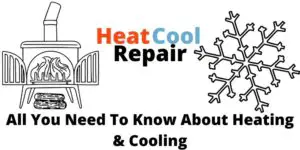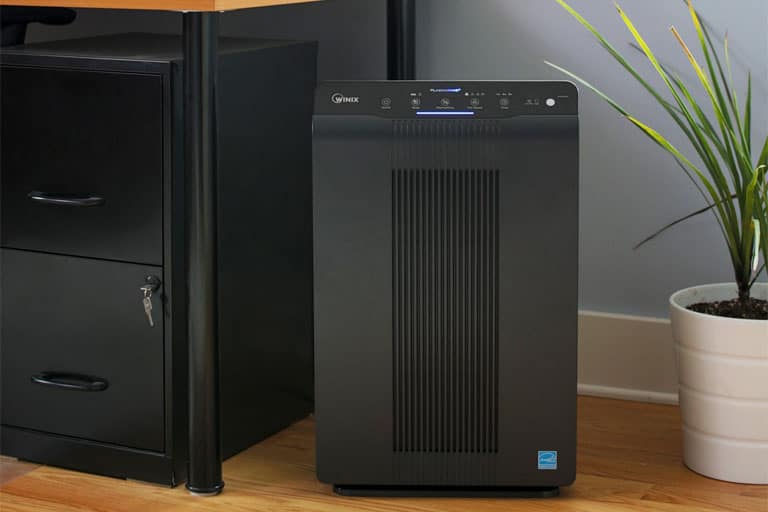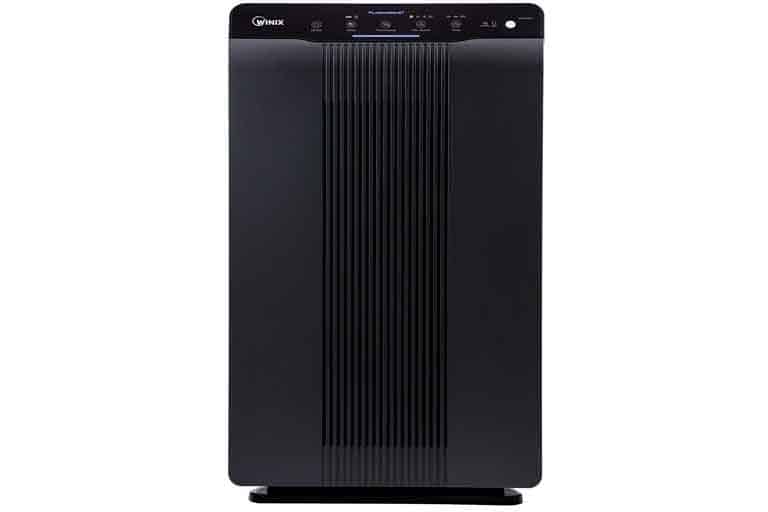Table of Contents
*This post may contain affiliate links. As an Amazon Associate we earn from qualifying purchases.
Image Source: Amazon
Many people think that just because they are inside their home, they are breathing in safe and clean air. Well, that’s far from the truth at all.
In many cases, the indoor air is much more polluted than the outside.
Continued exposure to poor indoor air quality puts the household members at risk of contracting ailments like allergies, asthma, and other respiratory issues. If you already have these diseases, poor indoor air quality can potentially aggravate such health issues.
Fortunately, there’s no shortage of air purifier that one can buy in the market.
So, you are probably asking: do air purifiers work? Well, that’s what we are about to find out!
How Does An Air Purifier Work?
Air purifiers are basically appliances that help in the removal of airborne pollutants. They are especially beneficial for people who suffer from asthma, allergies, and other respiratory diseases. They can also be used in both residential and commercial spaces.
In order to remove air pollutants and perform the said purifying, air purifying products utilize many different technologies. For instance, HEPA type purifiers use a fan to pull a fan via a pleated high-efficiency particulate arresting (HEPA) filters which traps the particles.
This particular type of purifier is one of the most common ones available and they also tend to be the most effective. Due to the use of fans, it doesn’t create any harmful pollutants that can damage the ozone. However, we advise that you be wary about buying air purifiers because not all products with mechanical filtrationutilize true HEPA filters.
Apart from mechanical filters, or in addition to it, other products utilize electronic technology that reverses the charge of the air particles. Then, the charged particles are then passed back out to the space where they eventually set on the floor, furniture, clothing, and more. This way, the allergens can be removed from the room by dusting and vacuuming the particles, so they don’t get reintroduced back into the air.
Pros And Cons
Before you decide to invest in an air purifier, it’s highly recommended that you weigh in the benefits and drawbacks of the appliance. While they do provide some great benefits, they’re not an exactly a perfect fit for all homes.
Pros:
1. IMPROVE INDOOR AIR
Quality
According to the Environmental Protection Agency: Americans spend an average of about 90% of their time in indoor environments, where the concentrations of known pollutants are generally 2 to 5 times higher when compared to typical concentrations found in most outdoor environments.
This is basically saying that indoor air in most homes are far more polluted than what you can find outdoors.
It’s even worse when people who are most susceptible to the adverse effects of pollution (children, senior citizens, people with cardiovascular or respiratory disease) are more likely to spend more time indoors.
This is not exactly surprising when indoor air is filled with typical pollutants like combustion byproducts, mold, pet dander, pesticides, lead, asbestos, and a host of other sources.
Things can become a lot worse if there’s a smoker in the household.
A purifier gives you the best fighting chance against these pollutants and keeps the air clean and healthy.
2. Reduced Symptoms
With an air purifying product, the quality of indoor air in a home will be significantly improved. This is very beneficial for people who are suffering from symptoms of respiratory problems and allergies.
In homes with pets, animal dander can also build up in air vents, etc. and can remain there for years. Many of the allergens and pollutants that make these symptoms worse are removed by the use of a purifier.
Just by having a purifier, the quality of life will be improved for household members who are suffering from allergies and respiratory problems.
3. HEPA Filters
The best air purifiers will have a HEPA filter which helps bolster its effectiveness. The HEPA standard is defined by the U.S. Department of Energy.
HEPA filters were developed to remove large enough particles like pet dander, pollen, and dust mites. Again, this is a significant boon to those who are suffering from respiratory problems and allergies.
4. Smoke Neutralization
As mentioned, air purifiers are great for a household with smokers. While it’s best for the smoker to quit altogether or not smoke inside the house at all, air purifiers can help by trapping the smoke that ends up sticking to the upholstery.
Plus, the best purifiers can remove unpleasant odors (including smoke) much faster than simply opening your window and letting them out.
Cons:
1. Ozone Emissions
There are many types of purifiers in the market and some of them are ozone generators – particularly electrostatic precipitators and ionizers. They emit ozone into the homes.
Ozone is a toxic, colorless, and unstable gas. It occurs naturally in the upper atmosphere but it’s also a common component of the man-made smog.
Such purifiers deliberately emit ozone gas in order to remove pollutants, chemicals, and bacteria in the air. However, there are some cases where the electrostatic precipitators and ionizers emit ozone but not deliberately but as a byproduct of their function.
2. Maintenance and Added
Cost
A lot of purifiers in the market rely on some type of filter and many of them have to be replaced. So, in order to ensure that the device doesn’t underperform, it’s important that the filters are periodically replaced. This could cost you $30-$200 each year on new filters.
There are purifiers that use re-usable containers or plates for collecting contaminants. Needless to say, these containers or plates must be regularly cleaned. While this is certainly cheaper in the long run, it can also be rather labor intensive.
Which Air Purifier Is the Best?
Image Source: Amazon
That’s a really complex question since everyone’s needs can vary. However, we have a few recommendations that you can check out:
Coway AP-1512HH Mighty Air Purifier
The Coway AP-1512HH Mighty Air Purifier is right up there with the bestpurifiers when it comes to performance and efficiency.
Just for having it for a few minutes, this “mighty” purifier has managed to reduce airborne particulate pollution by about 85%. It’s rated for spaces of 350 square feet, but I could have sworn that it can cover a lot more.
Simply put, it’s one of the best-performing air purifiers that I have tested. It can easily outperform a product that costs two to three times more.
And yes, it’s a very affordable air purifier.
While many purifiers tend to suffer in performance after quite some time, the Coway AP-1512HH has managed to provide long-term exceptional performance. No wonder it’s highly rated on Amazon.
Winix 5500-2 Air Purifier
The Winix 5500-2 Air Purifier is every bit as good as the previous product but it costs even less (currently on-sale). This purifier employs a True-HEPA filter which is capable of trapping 99.97% of airborne pollutants including dust mites, pet dander, pollen along with other microscopic allergens. So, if you have someone in your home who suffers from allergies, asthma, and other respiratory problems, this is a good product to consider.
It uses the PlasmaWave which acts as a filter to eradicate odor, allergens, chemical vapors and other pollutants. Best of all, it doesn’t emit any ozone, so you are not harming the environment at all. The unit is also equipped with smart sensors that gauge the air and it will automatically adjust the fan to filter the air as needed.
It’s not as good as the Coway purifier above but it’s certainly a close second in terms of performance. It doesn’t hurt that it looks great as well with its sleek, black design.
Do You Have A Cleaner Air In Your Future?
That wraps up our quick guide about air purifiers. Having an air purifier is one of the best ways to quickly improve the air quality in your home. I can still remember the day that we bought one for our home – it was such a revelation.
However, it’s not for everyone, so make sure that you consider the pros and cons before investing in an air purifying unit. Hopefully, this guide has helped answer the question of whether or not you need a purifying product in your home.



